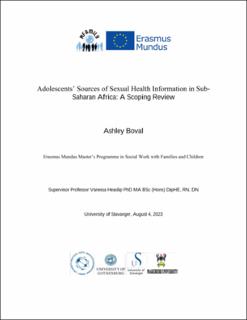| dc.description.abstract | Aim and Objectives: To determine the scope of research on Sub-Saharan adolescents’ preferences for accessing sexual health knowledge and information.
Background: Despite recent increases in positive sexual health outcomes for adolescents worldwide, young people in Sub-Saharan Africa continue to face some of the highest global rates of teenage pregnancy and HIV infection. Existing research into the sexual health of this population is focused on interventions and outcomes, often through the lens of adult practitioners. The current review examined the scope of research that have explored the source preferences for sexual health education from adolescents themselves.
Methods: This scoping review followed PRISMA’s Guide for Scoping Reviews to systematically search and analyze literature published between January 2013 and April 2023. Research was sourced from five public health and social sciences databases: AIM, CINAHL, MedLine, PubMed, and Scopus. Articles were assessed for methodological quality using the Mixed Methods Appraisal Tool (MMAT). Data from the literature was critically appraised using narrative analysis.
Findings and Discussion: 11 studies were included for review, encompassing qualitative, quantitative, and mixed data collection methods. Explicit discussion of adolescents’ stated preferences was a minor note in most research reviewed, behind outcome-focused analysis. Parents were identified as the most preferred source of sexual health information (in six articles); by contrast, very few adolescents reported a preference for learning about sex from mass media sources. Preferred sources of information varied minutely for different types of information (contraception versus puberty, for example), gender, and cultural background.
Conclusions: Research on adolescent preferences for sexual health education is limited. Additional, in-depth research is needed into adolescent preferences in order to best impact policies and social work practice. Social worker practitioners, especially, must prioritize adolescents’ preferences to best empower them to lead sexually healthy lives.
Key words: comprehensive sexual education, adolescents, Sub-Saharan Africa | |
